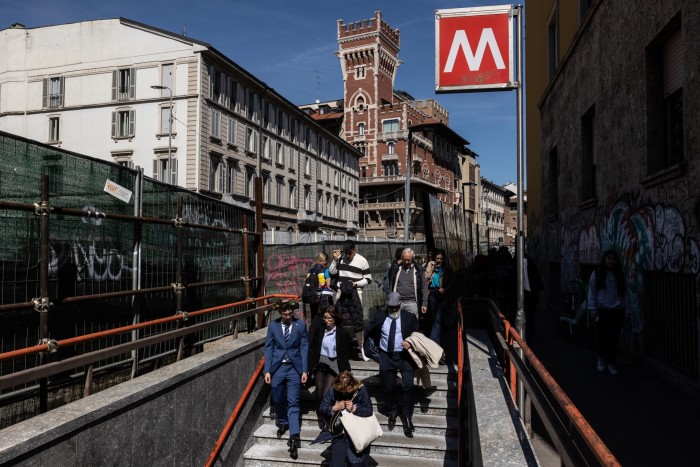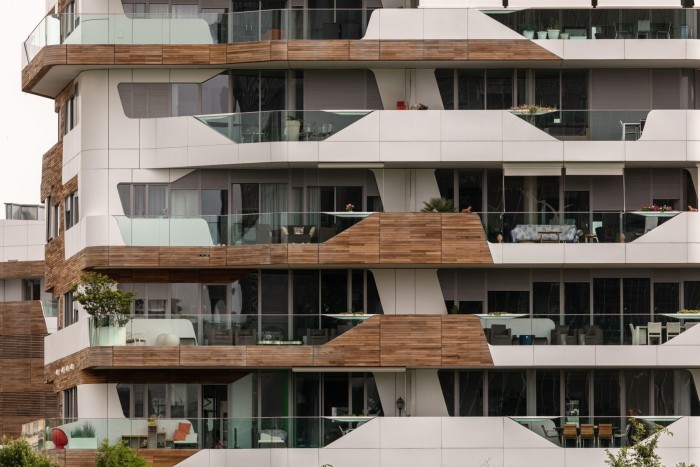
As Milan’s world-renowned Salone del Mobile furniture fair kicked off in April, the founders of the high-end lifestyle magazine Cabana threw a party to open their first shop and celebrate the publication’s 10-year anniversary.
“Our main markets are the UK and the US and we were originally planning to open our first store in London or New York,” said co-founder Martina Mondadori. Choosing Milan “would never have happened five or six years ago but suddenly on our doorstep there’s a completely different footfall.”
Mondadori, the fourth generation of a publishing family, left London and moved back to Milan in 2020 for family reasons, one of a number of Italians to have returned in recent years. They are increasingly being joined by wealthy foreigners, many fleeing the prospect of higher taxes in the UK and France.
The influx is bringing a newfound energy — and strains — to a city that has historically been perceived as parochial and ill-equipped to receive foreigners.
“The Milan I’m living in now is a completely different place to the Milan I grew up in,” said Mondadori. “It’s suddenly very dynamic and interesting.”
The turning point for the city was the Expo 2015 world fair a decade ago, which boosted the local economy, raised the city’s profile internationally and helped attract foreign investment.

A year later, just as Britain’s vote for Brexit encouraged some London-based Europeans to return home, Italy’s then prime minister Matteo Renzi’s centre-left administration announced a series of tax breaks designed to reverse the country’s infamous brain drain and lure wealthy foreigners.
The highest-profile sweetener was the svuota Londra (“empty London”) offer, where a new foreign resident — or an Italian who has lived abroad for at least nine years — can pay a flat tax of €100,000 a year on any foreign income and assets for up to 15 years, and be fully exempt from inheritance tax on foreign assets during that period.
Also known as the “footballers’ scheme”, the flat tax has attracted the likes of Cristiano Ronaldo, as well as private equity executives, oligarchs and entrepreneurs.
“It’s not a law we introduced but post-Brexit and now with the government change in the UK we hope it will make Italy more attractive” for the financial community, said Federico Freni, Treasury under-secretary and a member of deputy prime minister Matteo Salvini’s eurosceptic League party. “We want everyone to understand Italy is a friendly country.”
Meanwhile, Renzi’s government also unveiled an expat scheme that gives a 70 per cent reduction on taxable Italian income (90 per cent when moving to the poorer south), later reduced to 50 per cent by Giorgia Meloni’s nationalist government for those moving back from this year.
The tax breaks are having their intended effect. The flat tax scheme, which has survived five governments, has attracted 2,730 individuals, while almost 90,000 workers, mainly Italians, have benefited from the expat scheme, with many of them moving to Milan.
Some city residents are sceptical of the scheme’s benefits. “Everything costs more nowadays and all these foreigners come and go, what will be left is a bubble,” said one local councillor.
Milan’s property prices soared 43 per cent in the five years to 2023, compared with 9 per cent in the rest of Italy, according to real estate group Tecnocasa. Rental prices rose by a fifth in the two years to March.
Italians on average incomes have long complained about the city’s diminishing affordability. But proponents of the reforms insist the benefits for Milan outweigh the disadvantages.
“The flat tax regime has been successful,” said Francesco Capitta, a partner at law firm Facchini Rossi Michelutti in Milan. “The number of takers is going to increase — I don’t expect huge numbers because it’s aimed at high-net-worth individuals . . . but the benefit for the government derives from the fact that they tend to be big spenders and investors in the country.”
Italy’s sweeteners come as some other European countries are moving in the opposite direction.
The UK is abolishing its 225-year-old non-dom regime, which allowed 74,000 wealthy foreigners in the 2022-23 financial year to avoid paying tax on overseas income. The incoming Labour government has also pledged to remove non-doms’ ability to permanently shield foreign assets held in a trust from inheritance tax. Some fear it will also increase capital gains tax.
Labour has also struck fear into the UK’s private equity industry by pledging to close a “loophole” on the taxation of private equity managers’ profits on successful deals, known as carried interest. It is currently taxed as a capital gain at 28 per cent rather than as income, which attracts a top rate of 45 per cent plus national insurance.
The prospect of this fiscal tightening is prompting increasing numbers of wealthy individuals to leave the UK, according to advisers, with Italy and Switzerland the top European destinations.
One French investor in his forties said that he was leaving London next year because of the end of the non-dom regime and moving to Milan, having shed his initial scepticism over Italy’s flat tax now it has remained in place for seven years.

“Over time people have got more comfortable that Italy was trustworthy and a reliable partner,” he said. “More people came in, more energy came in and these things compound. You saw the same in France after Emmanuel Macron was elected.”
“Milan is having a bit of a moment right now,” added David Giampaolo, founder of Pi Capital, a London-based investor club. “I know of 10 non-dom families who are reluctantly leaving London — eight are moving to Milan, one to Switzerland and one to the UAE.”
Meanwhile, France’s wealthy are making contingency plans, unnerved by the prospect of tax rises, the reinstatement of the wealth tax, and years of political gridlock.
But people moving to Milan in search of la dolce vita face challenges, with demand for high-end housing and schooling outpacing supply and pollution that is among the worst in Europe.
“The supply of real estate is an issue in Milan,” said Daniel Shillito, founder of D&G Property Advice. “A lot of it is owned by noble families — palazzi on beautiful courtyards sit there vacant.”
There is “a challenge finding luxury apartments or homes in the city centre that have the amenities that wealthy foreigners have come to expect,” he added. “Rental prices are on average above the rest of Italy, and it’s not easy to find what you’re looking for.”

Nadim Nsouli, founder and chief executive of international private school operator Inspired Education Group, said there had been “dramatic growth and increase in demand” for its schools in Milan in recent years. “People used to call me to ask for help getting their kids into Wetherby” school in London, he said. “Now they want help getting their kids into St Louis,” he added, referring to the group’s international British school in Milan.
In the past three years, St Louis has grown from 1,200 students to 2,000 across its three campuses in Milan. Nsouli said the group’s schools in Milan were receiving inquiries from UK-based families caught by the abolition of the non-dom regime, and people considering leaving France because of the current political climate.
Katharine Kostyál, a contemporary art dealer, who runs the Kostyál gallery with her husband Carl, moved from London to Milan with her husband after Brexit, has noticed many new arrivals.
“It’s become a very European and interesting and dynamic place for us, both professionally and socially . . . you live like a God in an incredibly sophisticated but manageable and well-connected city,” she said. “You can be in the mountains or by the sea in two hours — and the whole of Italy and Europe is at your disposal. You live well and you live easily.”
London-style members clubs targeting expats and jet setters are springing up. Casa Cipriani opened in 2022, while private equity firm Three Hills Capital is backing the launch of a new club called The Wilde and SoHo house plans to open in Milan in 2026.
So far it is thousands rather than tens of thousands of highly mobile wealthy individuals and their families who are moving to Milan. Financial services firms are not embarking on big expansions there or moving people at scale, and the trend is not expected to move the needle for Milan as a financial centre. Nonetheless, the atmosphere is changing.
“With a small city like Milan, a small influx of people and capital can have a huge impact — on the way up and on the way down,” said the French investor who is moving there. But, pointing to his home country as a cautionary tale, he noted that many of those lured to France following Macron’s election seven years ago were having second thoughts. “You see how quickly things can change.”